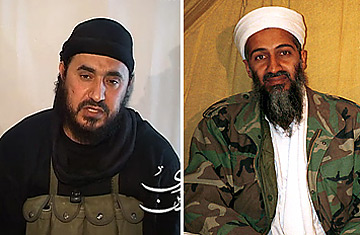
Abu Musab al-Zarqawi (left) and Osama bin Laden
Bush explained the declassified threat in some detail at the Coast Guard Academy, saying that bin Laden had tapped Abu Musab al-Zarqawi to organize attacks on the U.S. from his base in Iraq. Bush has long maintained that the U.S. would be creating a massive staging area for al-Qaeda if it pulled out of Iraq prematurely. In his speech, Bush reported that bin Laden directed a senior aide, Hamza Rabia, to huddle with Zarqawi on al-Qaeda's other attack plans around the world that year.
The new information tracked that contained in a Homeland Security bulletin made public in March 2005. Frances Townsend, the White House counterterror boss, said the information was declassified because all the players and sources associated with the information have been tracked down or killed. Asked about bin Laden's status, Townsend said, "I don't imagine he is very comfortable."
The declassification came just as the White House was in final negotiations with Congressional Democrats about a 2007 supplemental spending bill for ongoing military operations in Iraq. Late Tuesday afternoon, Hill Democrats, under pressure from the threat of continuing Bush vetoes, backed down on demands that new money for the war be coupled with a timetable for withdrawal. It is unlikely that Democratic leaders will stand down for very long, though; each time the Democrats forced Republicans to a vote on war funding, they could tally up a few more defections from the G.O.P.
In Iraq, meanwhile, where Zarqawi's poisonous legacy continues to plague all efforts to end the violence, Bush's revelation will most likely be received with little more than a shrug — as are most of the White House's claims linking Iraq to the global war on terror. From the Iraqi point of view, al-Qaeda came to their country as a direct consequence of the U.S.-led invasion. Any communication between bin Laden and Zarqawi about operations elsewhere are of no more than academic interest.
At most, some Iraqis may be tempted to speculate what might have been if Zarqawi had followed bin Laden's instructions and mounted more attacks abroad. Would it have distracted him from his murderous mission in Iraq, giving this country a breather?
But there was never any evidence that Zarqawi had any ambitions beyond Iraq's borders. The al-Qaeda bombings in Amman on Nov. 9, 2005, were an exception, but Iraqis attributed it to a personal grudge — Zarqawi was Jordanian, and had in his youth been jailed by the government. Even if Zarqawi was indeed planning other attacks outside Iraq, it certainly didn't slow down his deadly campaign of bombings across the country.
And if anything, al-Qaeda has grown even more deadly since Zarqawi's death, and the rate of suicide attacks has escalated sharply in recent months in response to the U.S. military "surge" in Baghdad. In the latest attack, at least 20 people were killed in a suicide bombing attack on a cafe in Mandali, a small Kurdish town on the Iranian border.
